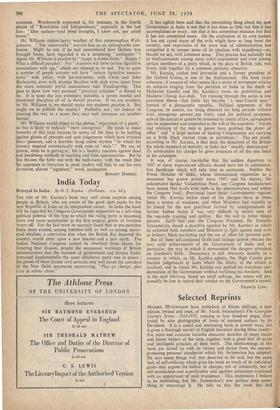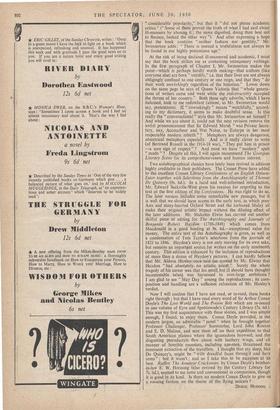Selected Reprints
MESSRS. HUTCHINSON have published, at fifteen shillings, a new edition, revised and reset, of Mr. Frank Swinnerton's The Georgian Literary Scene: 1910-1935, running to four hundred pages, illus- trated by nine photographs of busts of eminent authors by Jo Davidson. It is a useful and interesting book in several ways, for it gives a thorough survey of English literature during those twenty- five years and contains valuable character sketches of many major and minor writers of the time, together with a good deal of acute and intelligent criticism of their work. The shortcomings of the book are mixed up with its virtues and derive from the uncom- promising personal standpoint which Mr. Swinnerton has adopted. He says many things well that deserved to be said, but the same lack of self-criticism which gives the book so much of its individual gusto may expose the author to charges, not of insincerity, but of self-satisfaction and superficiality and egotism sometimes expressed with an appearance of mild truculence. This impression I believe to be misleading, but Mr. Swinnerton's new preface does some- thing to encourage it. He tells us that the book has had
",considerable popularity," but that it " did not please academic critics " (" Some of them proved the truth of what I had said about ill-manners by abusing it ; the more dignified, doing their best. not to flounce, looked the other way "). And after expressing a hope that the book contains " neither fashion nor gentility," Mr. Swinnerton adds: " There is instead a truthfulness not always to be found in our highly pretentious age."
At the risk of being declared ill-mannered and academic, I must say that the book strikes me as containing unnecessary verbiage. In the first paragraph of Chapter I, Mr. Swinnerton makes the point—which is perhaps hardly worth making—that authors (like everyone else) are born " untidily," i.e. that their lives are not always obligingly confined to one century or one reign, and that they " do their work unwinkingly regardless of the historian." Lower down on the same page he says of Queen Victoria that " whole genera- tions of writers came and went while she indestructibly occupied the throne of her country." Both these ugly adverbs:which I have italicised, look to me redundant (almost, as Mr. Swinnerton would say, pretentious). If. " unwinkingly" means "watchfully," accord- ing to my dictionary, it seems to make doubtful sense. Is this really the " conversational " style that Mr. Swinnerton set himself ? And while we are about it, could not the next revision remove the awful pronouncement that Sir Edward Marsh " was Private Secre- tary, nay, Accoucheur and Wet N4se, to Euterpe in her most respectable modern rebirth " ? Metaphors are always dangerous, obstetrical metaphors especially. And is it really clever to write (of Bertrand Russell in the 1914-18 war), " They put him in prison —a sure sign of respect " ? And must we have " modern " spelt " modn " ? Despite all this, I will again recommend The Georgian Literary Scene for its comprehensiveness and human interest.
Two autobiographical classics have lately been revived in editions highly creditable to their publishers. The Cresset Press have added to the excellent Cresset Library Confessions of an English Opium- Eater together with Selections from the Autobiography of Thomas De Quincey (9s. 6d.). In a lucid and well-informed introduction, Mr. Edward Sackville-West gives his reasons for re' rting to the text of the first edition of the Confessions. He was right to do so. The later version includes some remarkable new passages, but it is well that we should haye access to the early text, in which poor Ann and stony-hearted Oxford Street and the turbaned Malay all make their original artistic impact without the diluting effect of the later additions. Mr. Malcolm Elwin has carried out another skilful piece of editing for The Autobiography and Journals of Benjamin Robert Haydon (1786-1846) which comes from Macdonald in a good binding at 9s. 6d.—exceptional value for money. The entire text of the Autobiography is given, as well as a condensation of Tom Taylor's selections from the journals of 1821 to 1846. Haydon's story is not only moving for its own sake, but remains an important source for writers on the early nineteenth century. This edition is enhanced by the inclusion of reproductions of more than a dozen of Haydon's pictures. I can hardly believe that Mr. Aldous Huxley^once said (as quoted by Mr. Elwin) that Haydon " had absolutely no artistic talent." Surely the whole tragedy of his career was that his small but ([ should have thought) incontestable talent was harnessed to over-large ambitions ? I' am glad to see " May Day " among the reproductions ; its com- position and handling are a sufficient refutation of Mr. Huxley's verdict.
Now I will confess that I have not read, or re-read, these ,books right through ; but that 1 have read every word of Sir Arthur Conan Doyle's The Lost World and The Poison Belt which are re-issued in, one volume of Eyre and Spottiswode's Century Library (7s. 6d.). This was my first acquaintance with these stories, and I was simple enough, I found, to enjoy them. Conan Doyle provided, in the modern jargon, an admirable " panel " when he brought together Professor Challenger, Professor Summerlee, Lord John Roxton and E. D. Malone, and sent them off on their expedition to that South American plateau where the iguanadons browsed, and the disgusting pterodactyls flew about with leathery wings, and all manner of horrible monsters, including ape-men, threatened the imminent extinction of the travellers. I thought that my sleep, like De Quincey's, might be " with dreadful faces throng'd and fiery arms " ; but it wasn't ; and so I take this to be escapism at its best. Raffles, The Amateur Cracksman, by Conan Doyle's brother- in-law E. W. Hornung (also revived by the Century Library for 7s. 6d.), seemed to me tame and conventional in comparison, though it is good in its kind. Is there no modern Conan Doyle to give us a rousing fantasy on the theme of the flying saucers ?
DEREK HUDSON.















































 Previous page
Previous page